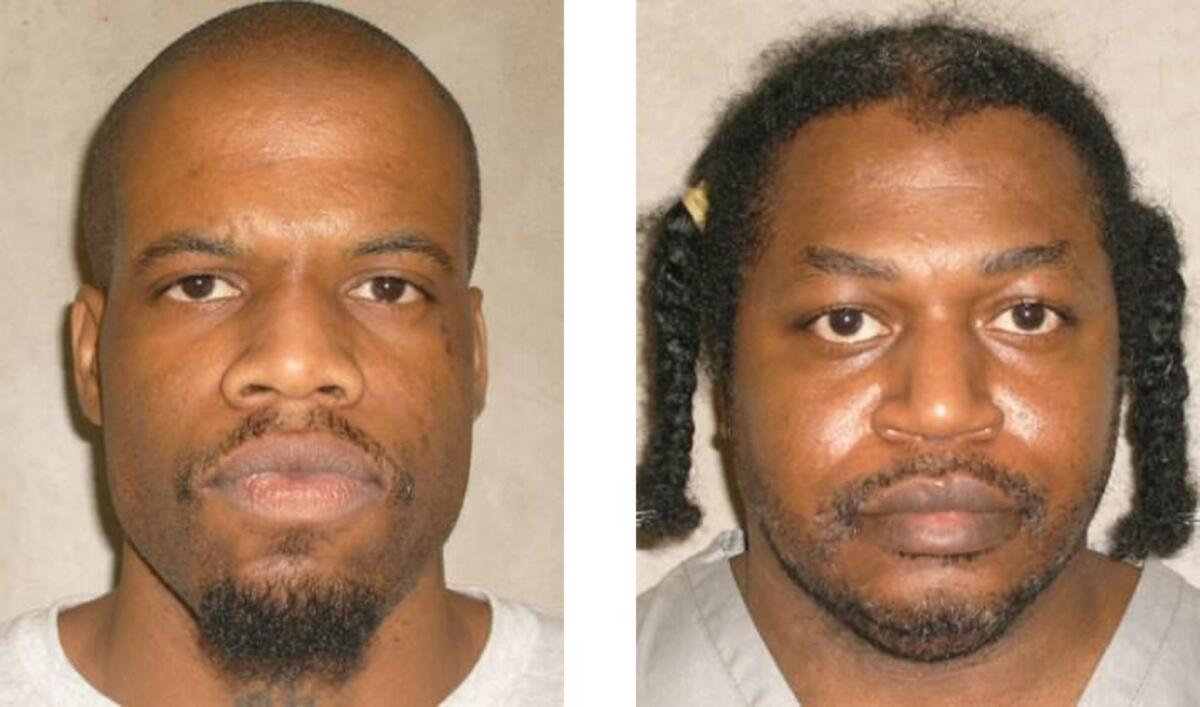Botched Oklahoma execution boosts conservative death penalty foes

The botched execution of convicted killer Clayton Lockett may be the best thing that ever happened to death penalty opponents.
The hideous way in which Lockett was killed by Oklahoma corrections officials, who injected him with a secret, untested three-drug cocktail, should apall even the most ardent death penalty supporters.
Lockett, 38, was declared unconscious 10 minutes after he was given what was supposed to be the lethal mix—a sedative, a drug to stop his breathing, and a drug to stop his heart--but then began “twitching,” “mumbling,” “writhing around” and calling out, his attorney told my colleague Molly Hennessey-Fiske.
Prison officials then turned off the microphone in the death chamber, and a curtain was drawn to prevent witnesses from seeing what had to have been a grotesque scene. Officials then called off the execution. But 43 minutes after he was injected, Lockett suffered a massive heart attack and was declared dead. Prison officials immediately called off a second execution that was planned the same night.
“When I read the headline, I assumed it was a story out of Pakistan or China,” said Marc Hyden, national advocacy coordinator for Conservatives Concerned About the Death Penalty, a national network of conservative Republicans and libertarians who object to capital punishment. “I didn’t want to believe that that could actually happen in America.”
I met Hyden by chance last month at the CPAC conference outside Washington. We were standing next to each other in an interminable line at a Fedex office and struck up a conversation. I confess I was somewhat incredulous when he told me that he had left a job at the NRA to agitate against the death penalty among the very people who support it most.
“That’s why we call it ‘Conservatives Concerned,’” he said. If you can get people to start thinking about what’s wrong with the death penalty, he explained, they can often be persuaded that opposition to capital punishment is not at odds with conservative values.
What do conservatives find objectionable about the death penalty?
Some object to the high cost of capital punishment cases relative to the cost of life in prison without the possibility of parole. Some simply distrust government, particularly as so many prisoners -- 316-- have been exonerated by DNA testing. Eighteen of those exonerated, according to the Innocence Project, were on death row for crimes they did not commit. Some believe that supporting the death penalty is a contradiction for those who consider themselves “pro-life.”
Hyden also told me that many murder victims’ families oppose the death penalty because of the “emotional roller coaster” it has become for them.
That does not appear to be the case for the family of Lockett’s victim, 19-year-old Stephanie Neiman, who was just two weeks out of high school when she was abducted and tormented by Lockett and his accomplices before she was shot and buried alive. Her parents asked a jury to impose the death sentence on the man who killed their only child.
Who could blame them?
But the untenable situation that played out Tuesday night is unworthy of a civil society that disdains punishment that is “cruel and unusual.”
Many have said that part of the problem lies in a shortage of lethal drugs that has forced prison officials to make up untested protocols. European pharmaceutical manufacturers, who oppose the death penalty, have refused to sell drugs that are part of a lethal cocktail. States will not reveal the drug combinations, nor the sources of the drugs they do procure, for fear of igniting protests. In Georgia, Hyden noted, legislators passed a law last year making the procurement of lethal injection drugs a “confidential state secret.”
But no government and no drug company should be allowed to hide behind this absurd veil of secrecy.
“We don’t even know if the sources are legal,” said Hyden. “That’s not transparency in government. That kind of secrecy only serves the government’s interest.”
The terrible event at the Oklahoma State Penitentiary in McAlester, OK, comes at a moment when opposition to the death penalty is at an all-time high, and is no longer the excusive domain of left-leaning or religious groups.
“This trend is not limited to bleeding-heart liberals and crime coddlers,” says conservative movement stalwart Richard Viguerie on the Conservatives Concerned About the Death Penalty website.
In February, one of Lockett’s other robbery victims expressed dismay at the relatively painless death that was supposed to await Lockett.
“Clayton being put to death by lethal injection is almost too easy of a way to die after what he did to us,” wrote Bobby Bornt, according to the Tulsa World. “He will just be strapped to the table and will go to sleep and his heart will stop beating.”
I tried, but was unable to find Bornt in Perry, Okla., on Wednesday. I can imagine that he may be among those who are not outraged by what happened Tuesday night, particularly as Lockett’s protracted demise so strangely mirrored the one that he inflicted on Neiman, a friend of Bornt’s.
For the rest of us, the ones in whose name the government kills for justice, Oklahoma’s shameful execution serves as a wakeup call about a morally corrupt process.
This is one of those rare issues where conservatives and liberals increasingly are making common cause.
ALSO:
Twitter: @robinabcarian
More to Read
Start your day right
Sign up for Essential California for news, features and recommendations from the L.A. Times and beyond in your inbox six days a week.
You may occasionally receive promotional content from the Los Angeles Times.







